Our brains having been cobbled together over millions of years of random variation and natural selection…it’s astonishing that they do their job as well as they do. Still, as is the case with so many of our inherited features1, there’s certainly room for improvement. We might be smarter, less prone to psychoses and dementia, better at making decisions2.
Perhaps some gene tweaking might give our descendants better brains…but that’s no comfort to us now. Perhaps drugs might do the trick? It’s certainly a concept that science fiction writers have explored many times over the years—consider the following works about mind-altering drugs.
Brave New World by Aldous Huxley (1931)
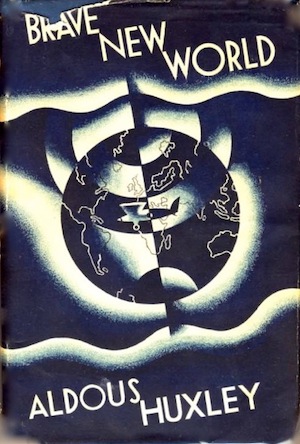
Each person in the orderly world of tomorrow is prenatally crafted3 to suit the role for which they are destined. No person is burdened by intelligence in excess of that which their position requires. Were that not sufficient, children are relentlessly conditioned to accept their lot as the best possible niche to which they could aspire.
Conditioning and design can fail. Enter soma, a wonderful drug that calms even the most agitated person…but only if that person is willing to take soma. The puritanical Savage, born and raised far from mainstream society, eschews soma’s comforts and so embraces the full misery of his situation.
As self-sustaining dystopias go, Brave New World’s isn’t terrible. At least, unlike many of its rivals, the primary means of getting people to go along with the system is to ensure that each person is content, rather than terrorizing the masses into compliance. Of course, not everyone is content, but the World State has coping mechanisms for that as well.
“Carcinoma Angels” by Norman Spinrad (1967)
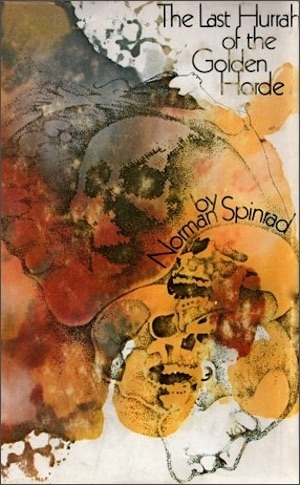
[Collected in The Last Hurrah of the Golden Horde] From age nine, Harrison Wintergreen had the knack for transforming circumstance into profit. Harrison spent his life going from victory to victory in almost every possible field, from investments to debauched sex. How vexing, therefore, that such a champion among mortals is faced with an opportunity whose only outcome was death. Against terminal cancer, even great men are powerless.
At least, great men not named Harrison Wintergreen are powerless. Harrison sets out to cure the incurable. Ultimately, his quest leads Harrison to mind-altering drugs, the means by which Harrison will confront and defeat cancer. Victory is assured…provided that Harrison hasn’t overlooked some important details.
Harrison isn’t just a sex-crazed oligarch. Harrison is a sex-crazed oligarch whose ostensibly benevolent public works include sterilizing millions of Third World women. This might well have attracted criticism—my eyebrows certainly shot up when I reached that part of the narrative—except that oligarchs like Harrison generally get to define what is and what is not considered beneficial.
“… for a Single Yesterday” by George R. R. Martin (1975)4
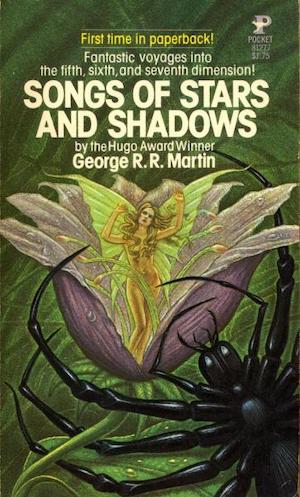
[Collected in Songs of Stars and Shadows] Four years after the Blast, memory-enhancing chronine’s induced hallucinations are the only means by which Keith can revisit long-dead Sandi, killed in the nuclear war. The commune values Keith’s prodigious musical talent and does not begrudge him his habitual time-tripping. Everyone in the commune lost someone in the Blast.
Lieutenant Robert Winters believes chronine can serve a more vital purpose than muting one man’s grief. Properly used, the drug could allow the commune to recover skills thought forgotten. Winters has sympathy for Keith…but that won’t stop the former officer from doing what’s best for the commune as a whole.
Small communities cannot avoid oversights. In this case, it turns out that while everyone was happy to listen to Keith’s songs, it didn’t occur to anyone to write down his lyrics5. In fact, until Winters arrived, the commune was short on many necessary skills. All they had in common was one property: not being important enough to nuke, or being downwind of any place that was.
Akira by Katsuhiro Otomo (1982)
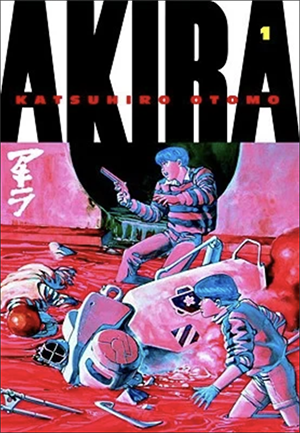
Rebuilt after the mysterious calamity that leveled Tokyo, Neo-Tokyo is a corrupt state that rules disaffected masses. Delinquents like Kaneda and Tetsuo fill their meaningless lives with drugs, sex, and violence. A chance encounter with a strange, wizened figure puts Tetsuo on an entirely different and far more violent path.
The Japanese government has long funded research into paranormal powers. Researchers have invented a process, in part dependent on drugs, that can produce psychics. It’s one such psychic that Tetsuo encounters. The psychic sees that Tetsuo has great potential. Tetsuo is recruited into the project. Too bad that Tetsuo may well turn into a kaiju-level psychic threat.
It was an earlier mistake like this that leveled Tokyo.
Readers might wonder why Japan continued such a dangerous project. They did because psychic research was like nuclear weapons: too dangerous to leave to other nations. What I wonder is why the research facilities had to be in Tokyo rather some far more expendable prefecture.
The Summer Queen by Joan D. Vinge (1991)
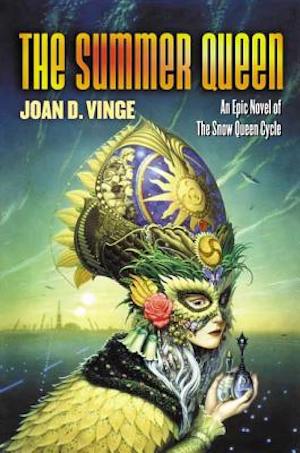
Barbaric world Tiamat is the sole source of the age-arresting drug Water of Life. The Water of Life is why Tiamat continued in its technology-arrested state. The Hegemony, determined to ensure continued access to Water of Life, systematically sabotaged development on Tiamat.
At least, they did until Moon, the Summer Queen, ended Hegemonic control of Tiamat.
Readers then learn that life-extension was an accidental side-effect of a drug created by a long-fallen empire. The drug was intended to create an information-disseminating network whose human terminals are known as the Sybils. The Hegemony, unaware of the connection between Tiamat and the Sybils, has crippled the Sybil network. Now the Sybil network can recover… if only agent BZ Gundhalinu had not just handed the Hegemony the means to reconquer Tiamat.
One moral here is that you can’t be sure to what use subsequent civilizations will put your technology. Also, that the Hegemony really should have asked why the Sybils existed, although that might not have prevented them from pursuing immediate benefits over long-term costs.
A pill that somehow makes one better is an old, old idea. The above works are just a very small sample of SF featuring mind-altering drugs6. Perhaps I missed your preferred example. Feel free to mention it in comments below.
- The human spine could certainly do with some improvement. ↩︎
- Although that raises the question of what one means by “better.” A subject for another day. ↩︎
- Huxley’s novel doesn’t feature genetic engineering, which didn’t exist when he was writing. If it had, he would surely have embraced it as a plot device. ↩︎
- This is the story that introduced me to Janis Joplin’s music. I was one of the Lucky Ten Thousand on that day. ↩︎
- Presumably, pre-war song books containing lyrics to the songs that Keith had remembered and was singing might one day be discovered in some less fire-ravaged library. ↩︎
- I haven’t discussed all the works that came first to mind, the works I read as an impressionable teen back in the 1970s. People sure liked their drugs back in the 1970s. ↩︎










